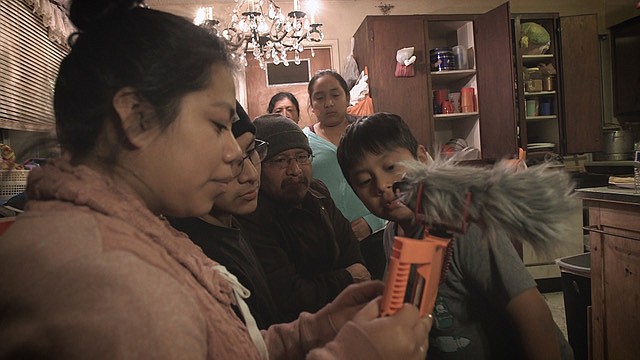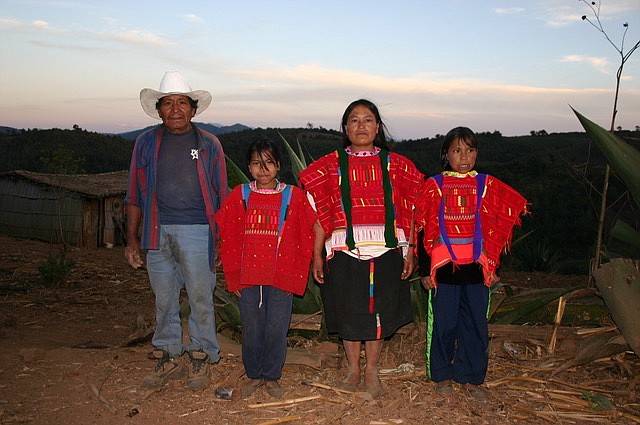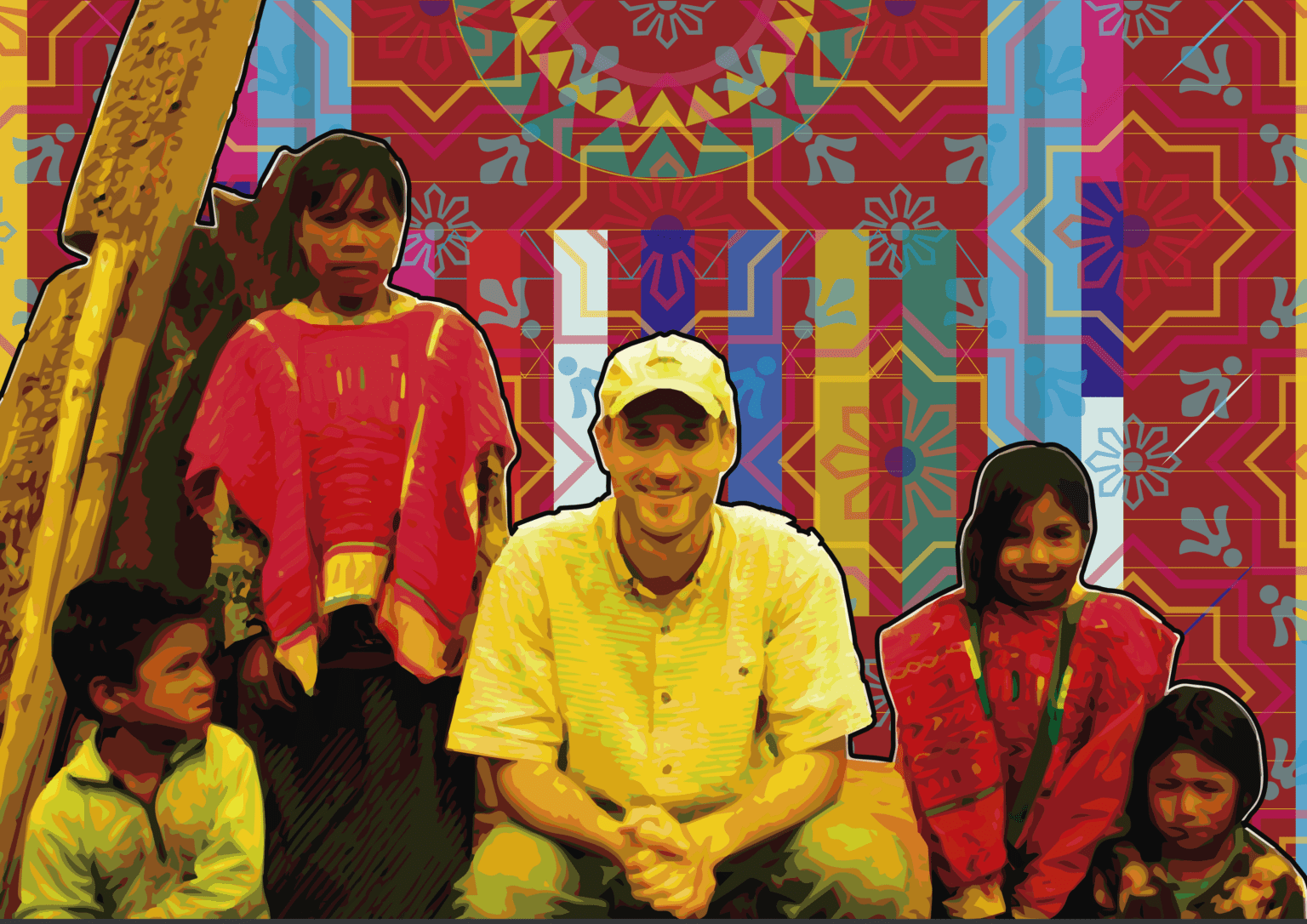What is home? Is it the place where you live and work, or is it the land where your ancestors first settled?
That question is at the heart of the short documentary “First Time Home,” but it’s far from the only subject to be explored by young filmmakers Noemi Librado Sanchez, Heriberto Ventura, Esmirna Librado and Esmerelda Ventura. The film — which will be screened Thursday, April 14 at the Lincoln Theatre, and Saturday, April 16 at the Pickford Cinema — also touches on the concepts of borders, looks at the disparities between the lives of immigrants and those they leave behind, and shows how families can stay connected, even when they’re thousands of miles apart.
In 2016, after cousins Noemi, Heriberto, Esmirna and Esmerelda learned their grandfather in Mexico was sick, they traveled from immigrant communities in the Skagit Valley and Central California to their family’s ancestral village in Oaxaca — somewhere none of them had ever been before. Before leaving, they interviewed relatives, shot footage in berry fields and recorded video letters for their kin in Mexico.
The opening shots of “First Time Home”
reveal a hilly expanse in San Martin, Oaxaca, with a man’s voice saying in Spanish, “I come from a very small village. It’s so quiet and peaceful. But in reality, the village is very poor. And here, sometimes we have work, sometimes we don’t.”
“Here” is the Skagit Valley, where the next shots reveal a rainy field where approximately 60 farmworkers are clipping blueberry branches.
“As always, I don’t see any Americans here,” the man, Antonio, says. “The wages are not worth it for them to be here in the mud and cold.”

The next scene takes place in an overcrowded apartment, where kids and adults jostle for space around a cake depicting a car traveling from Washington to Oaxaca. Viewers learn that Triqui people are native to the state of Oaxaca and began to migrate to the United States in the 1990s. Today, 25,000 Triqui people remain in Mexico, while approximately 10,000 are in the U.S.
“We work from sunrise to sunset,” Antonio says to the camera. “That’s not life. We don’t have time for our children, or to do things at home. When we leave for work, our children are asleep. And when we get home, they are asleep again. We have to work long hours to save and support our families back in Mexico.”
Jaime, a farm mechanic, points out that his American counterparts make $25 per hour to his $13, even though they do the same job. And Francisco, a farmworker, pleads with the teenagers to make a film showing how people from their hometown suffer, so viewers can understand that the little money they have to support themselves is often sent by their children in the U.S. — many of whom they haven’t seen in more than 15 years.
As second-generation immigrants, Noemi, Heriberto, Esmirna and Esmerelda speak English and Spanish, as well as some Triqui. This comes in handy when they finally arrive in San Martin and need to communicate with their aunts, uncles, cousins and grandparents. Parts of the reunion are joyous, but it’s clear life isn’t easy for their relatives, and the video letters they film can be heartbreaking to watch.

But the teens show a resilience and acceptance that makes it clear the journey was worth their time, and that the “home” they were seeking has been there all along.
“These families, who live and work in the Skagit Valley and feed all of our society, live in very difficult circumstances, show incredible strength and resilience and deserve our attention and respect,” film producer Seth Holmes said in advance of the screening of the movie.
Keep this in mind when Noemi, Heriberto, Esmirna and Esmerelda join panel discussions after showings of the film in Mount Vernon and Bellingham. They’ll be answering questions and sharing what they learned from the experience.
“By joining us as we visit our ‘home’ in Mexico for the first time, meet our relatives and spend time with our elderly grandpa, we hope our film introduces you to the lives and realities of immigrants, farmworkers and Indigenous families like ours,” the filmmakers said in a statement on their website. “We hope the film shows all of us how we are connected, including across borders.”
“First Time Home” shows at 7 p.m. Thursday, April 14 in Mount Vernon at the Lincoln Theatre, and 11 a.m. Saturday, April 16 in Bellingham at the Pickford Film Center. Both screenings are by donation. To procure tickets, go to lincolntheatre.org or pickfordfilmcenter.org. To learn more about the film, go to firsttimehomefilm.com
Bellingham Human Rights Film Festival
Although it’s smaller than it has been in the past, the Bellingham Human Rights Film Festival (BHRFF) will return this week after a pandemic pause. All of the following movies will show at the Pickford Film Center, 1318 Bay St. Entry is by donation.
“Inhabitants”: At 5:30 p.m. Thursday, April 14, see a film exploring the deep knowledge that five Native American nations direct toward land and watershed management practices in order to address critical environmental challenges facing deserts, forests, mountains, coasts and prairies in what today is known as the United States. The screening of “Inhabitants: A Native Perspective” will be followed by a panel discussion with BHRFF and Children of the Setting Sun.
“First Time Home”: This stirring documentary showing at 11 a.m. Saturday, April 16 depicts young people of Triqui (Oaxacan) heritage as they make their first visit to the traditional homeland of their parents. This becomes a powerful time for deepening understandings of familia as well as Indigenous identity. A panel discussion will follow.
“Youth v Gov.”: In commemoration of Earth Day, watch this film at 5:30 p.m Thursday, April 21. “Youth v Gov.” highlights young people from across the United States who join together to sue the federal government for violating, through policies that accelerate climate catastrophe, their human rights to a healthy future. A dozen local environmental organizations are co-presenting the event and a panel discussion with plaintiff Jacob Lebel will follow.
More films: In the past, BHRFF has acquired most of its festival films for continuous availability in the community. They can be found at the Bellingham Public Library, Wilson Library at Western Washington University or Whatcom Community College (accessible with a Bellingham Public Library card). At bhrff.webs.com, click on the Film Archive tab to find a full list of films and which library they are in, as well as organizations you can contact to take action on the issues presented in the films.




